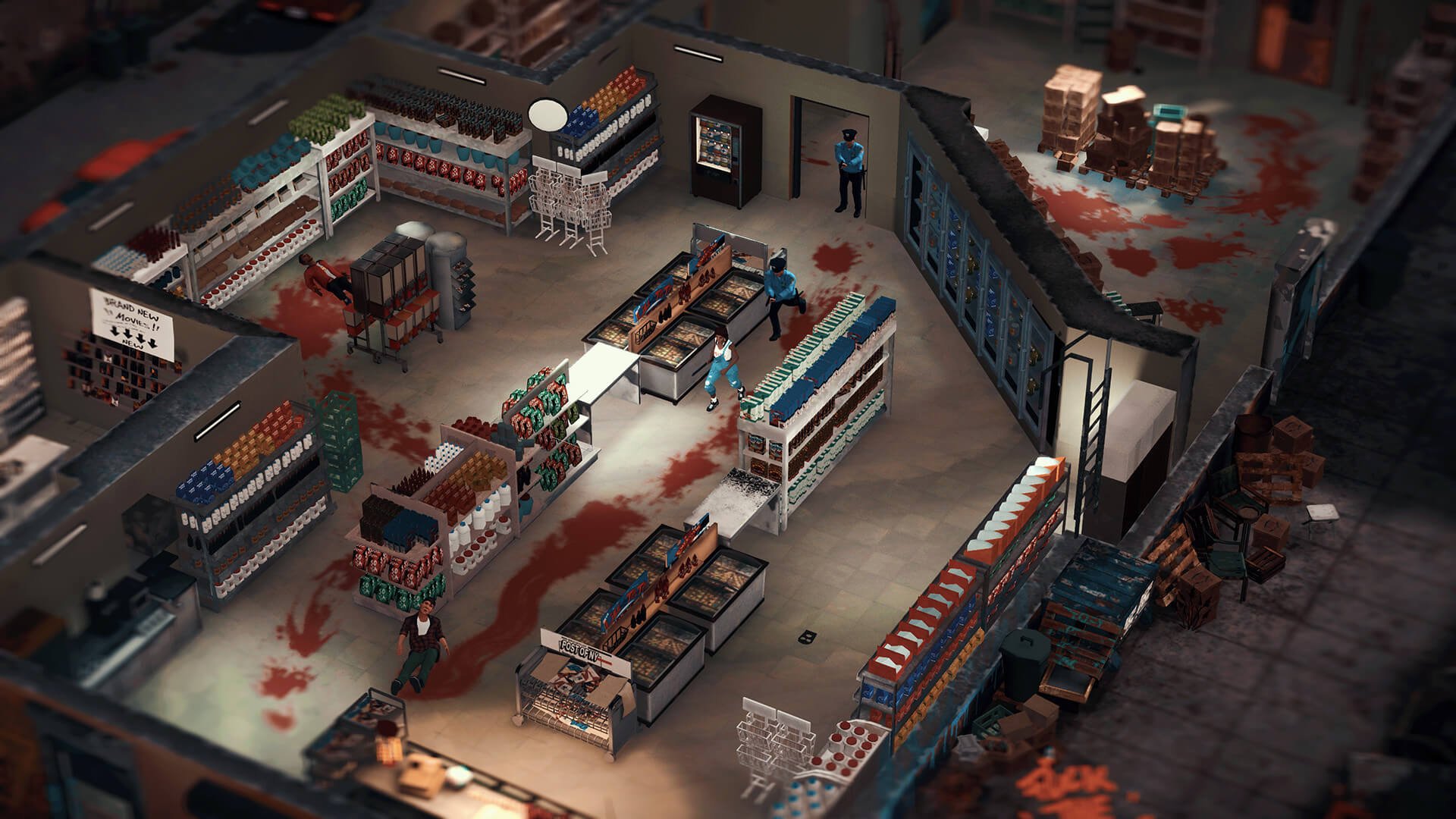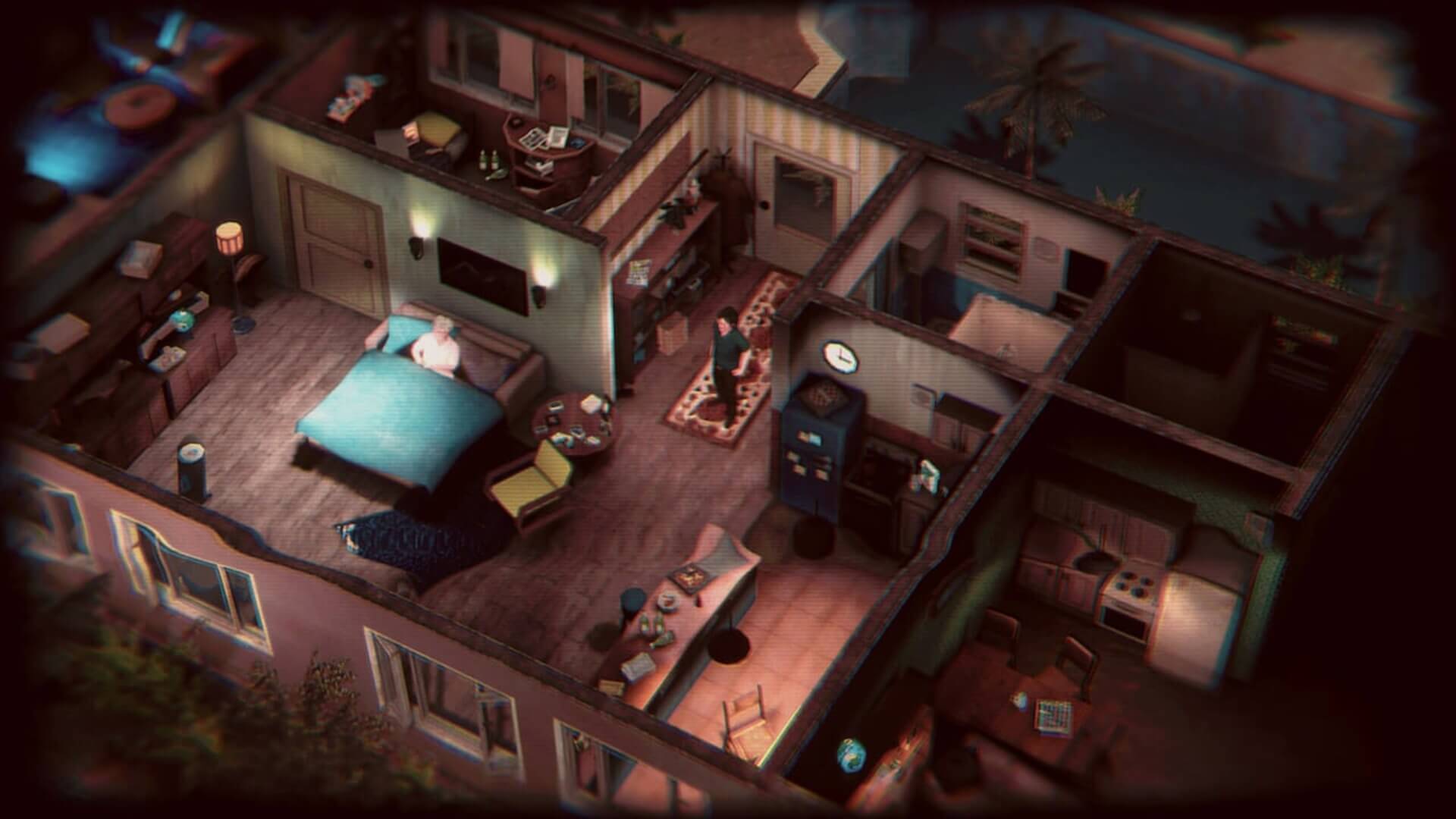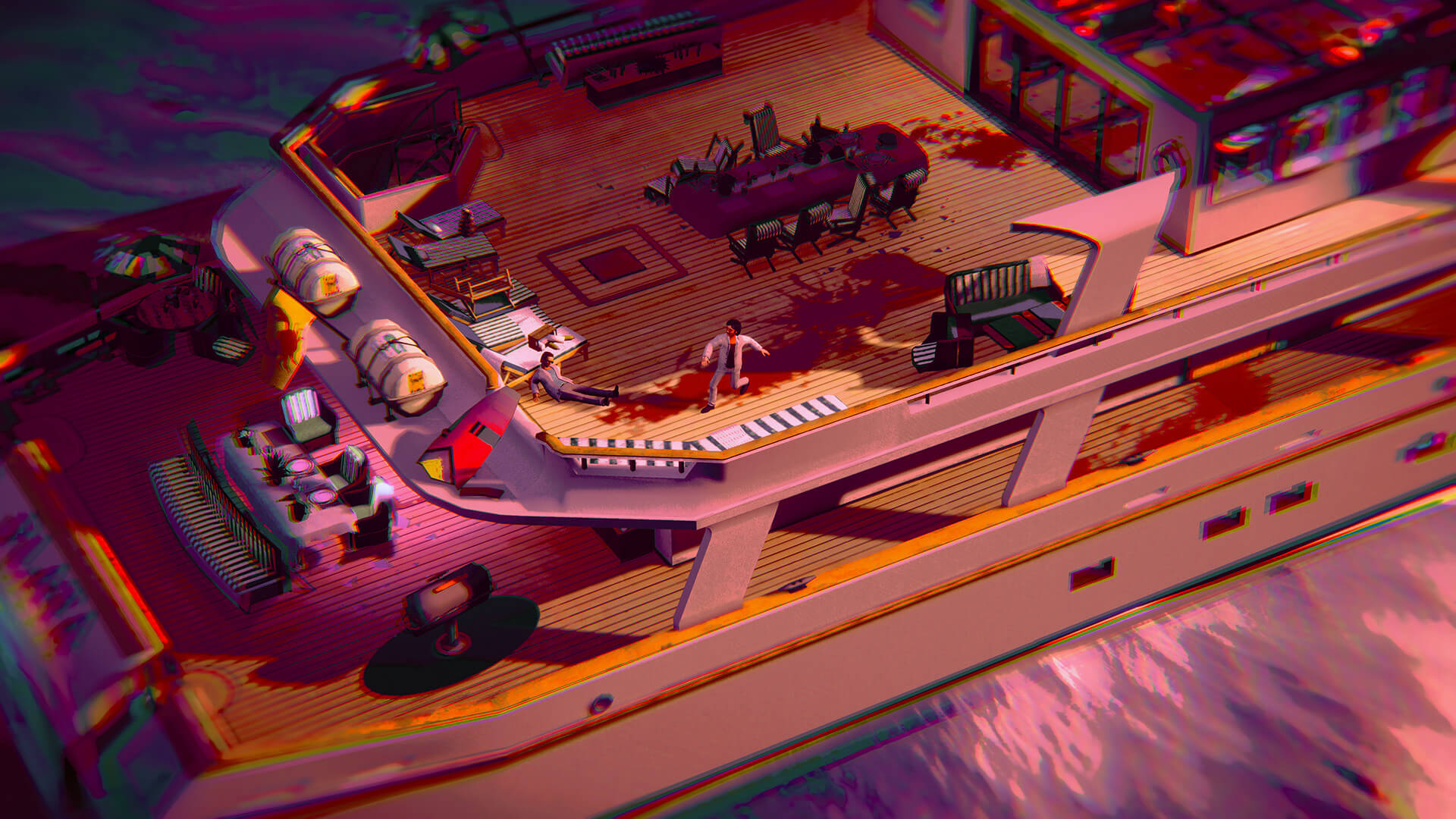If the impactful release of PowerWash Simulator proved anything, it’s that the cleaning genre of games has finally been given the spotlight it deserves. It’s not just the zen of the activity taking center stage, but the idea that so much history can be washed away with just a quick clean — history and evidence. It’s the latter of which that gets a sharper focus, with the release of Serial Cleaners.
This is the latest game from Polish developers Draw Distance, responsible for the original Serial Cleaner, as well as the top-down action title Ritual: Crown of Horns. Serial Cleaners sees the OG cleaner Bob return to the artistic endeavors of cleaning up murder scenes, his fixer lifestyle continuing well into the 90s. With the turn of the century fast approaching, Bob celebrates with 3 other cleaners, Lati, Vip3r, and Psycho, with all of them reminiscing over their origins, and what the decade meant to them.
There’s a focus on growth that’s always readily apparent in Serial Cleaners, not just narratively, but on a meta-level also. The expanded scope of jobs that need doing in order to save face of grimy mafia-types compliments wonderfully with what the 90s offered: Techno-bars, brutalism, and yuppies wearing suits while spending thousands on bad dinners — lifestyles that ultimately go nowhere. It’s some profound stuff, and contrasts with the cleaner’s personalities wonderfully, whether they’re doing it for the name, the game, the fame, or because they’re lame.

It’s a departure from the original’s more poppy outlook on pushing up daises, both artistically and visually. The pizazz and sharp coloring of characters and levels are gone in favor of the 90’s more grungy affairs. You will never not look like you just entered a battlefield in X-Com 2, which can suck considering the unique charm the original had visually. There are moments here where you’ll forget that this is a sequel to something that had you running through blood-soaked streets so you could get home in time to watch Columbo with your mom.
Thankfully, that essence isn’t lost in the gameplay, as Serial Cleaners is still an action-stealth affair where you clean up crime scenes while avoiding police officers who’re patrolling the area. The main objectives will always be composed of disposing of the bodies and evidence left behind in grisly encounters, as well as cleaning up as much blood as possible. The game never asks you to fully wipe clean any area, which is rather inexplicable considering the profession, but then again, fixers are meant to be cleaning the crime scene before the cops show up, so it is what it is.
It’s all very bite-sized and methodical, despite being more free-flowing when compared to the original’s 2D top-down format. Now it’s isometric, 3D, and multi-layered with different floors, which can get busy, especially with every 90s aesthetic known to man being put through a blender all at once. With that said, the ways to navigate have opened up, allowing more flexibility in what would usually have one solution.

While Bob himself is played more straight mechanically, the other 3 cleaners possess more unique skills. Lati is more acrobatic and is able to maneuver over crime scenes quite efficiently, Vip3r can hack into nearby computers to create distractions, and Psycho? Psycho sucks. His big gimmick is that he can chop up bodies into limbs, which creates a mess, but the limbs can be used as a weapon with an awkward throwing mechanic attached. While it can knock cops out, it fails to be useful due to the trajectory-based aiming, and the lack of impact.
The thing is, Serial Cleaners has all the makings of a video game, but less of a crafted core experience, and more of a forced ruleset that seems to expand without any eloquence. Vip3r’s hacking proficiency only goes so far as creating noisy distractions, but you can usually activate the objects she can hack by walking up to them. Bob can only carry a body over his shoulder when it’s been bagged and wrapped up, but Lati can carry a body over her shoulder regardless. Is the difference down to the preference of the characters?
It’s arbitrary, to say the least, since the dominant strategy takes effect when simply just carrying bodies in and out of crime scenes, only briefly blindsiding you in later stages. One of the last levels involving Psycho tasks you with bringing a body out of the watchful eyes of 2 SWAT snipers, and if you failed to have to a distraction on hand before checking it out? You have to possess impeccable timing to swipe the body before they notice you.

It’s rare that the level design can unintentionally screw you over like this, but it’s worth pointing out that the only answer Serial Cleaners has in terms of evolution, is complexity. Complexity that rarely sees its avenues explored, only blasted through by merely running in a straight line everywhere, with little to no punishment involved. Despite having a manual save mechanic, the game autosaves with each body disposed of, which removes many fears involving level progression.
Again, it falls in line with Serial Cleaners‘ desire to grow bigger, but without any cause to make a statement with its scale, even when the intent is obvious. With the story, you have 3 new characters, Bob helping them onto a path they may or may not have wanted, while also being a father figure to them regardless. Whether they desire devotion, consider him a mentor, or secretly harbor resentment towards him, he’s a universal McGuffin that could take the plot in so many ways.
Without getting into spoiler territory, Serial Cleaners goes nowhere. Draw Distance struggle to find the right type of genre to convey their story in — potentially a side-effect of the game cramming in as many visual flavors as possible — the result being a grey mass of neo-noir and Tarantino fan-fiction. When your plot twist has to be revealed with no context on a loading screen, you get the feeling too many ideas were put forward, and everyone was too afraid to say no to any one of them.

The main problem comes from the plate being too small for everyone to get their share. Bob doesn’t need his, as he has a whole previous game to love his mother in, but Psycho, Lati, and Vip3r are forced to fight among themselves for the spotlight, despite none of them having clear aspirations. Lati is the only one with clear-cut motives throughout the entire game, yet she runs in circles repeating herself at each turn.
Serial Cleaners also tries the “crime life is no different from the 9-5” trope again, forgetting that the original Serial Cleaner also did that, without hammering the message into the ground. It’s incredible how despite having little to nothing to work with, the game is still scared that its one message will be misread. “The new century isn’t anything special, it’s another day, it’s another grey hair, it’s one more newspaper that dates itself on a pile of metal trays, all while you’re wondering if Sisyphus smiled”? We know. We don’t need to be stuffing dead men into station wagons to figure that out.
At the end of it all, it’s rare to find something that could only be described as a “Video Game ” quite like Serial Cleaners. There’s no message here that isn’t bogged down by blasting you with visuals that tell the same tale, there’s no gameplay here that isn’t ruminated upon further by past experiences. It’s not a journey, nor an odyssey. Not a story to read into, just a couple of hours stabbed in the back. Was it worth it? I dunno… is anything?
” quite like Serial Cleaners. There’s no message here that isn’t bogged down by blasting you with visuals that tell the same tale, there’s no gameplay here that isn’t ruminated upon further by past experiences. It’s not a journey, nor an odyssey. Not a story to read into, just a couple of hours stabbed in the back. Was it worth it? I dunno… is anything?
TechRaptor reviewed Serial Cleaners on Xbox One S using a copy provided by the publisher. It is also available on Xbox Series S|X, PC, PlayStation 4, PlayStation 5, and Nintendo Switch.
Serial Cleaners Review
Source: Pinay Guide Blog
Walang komento:
Mag-post ng isang Komento